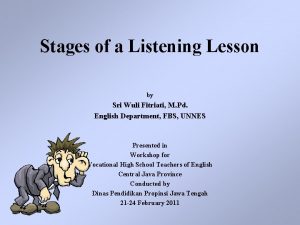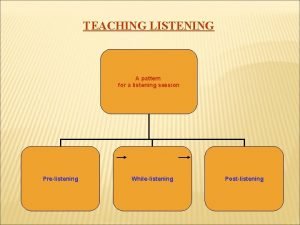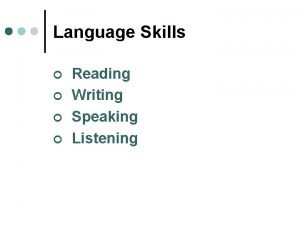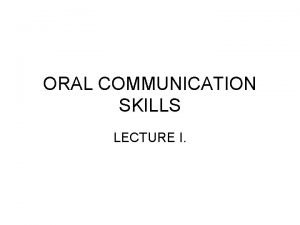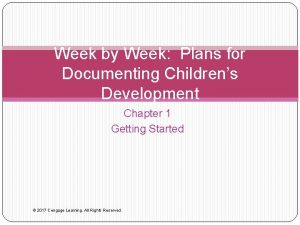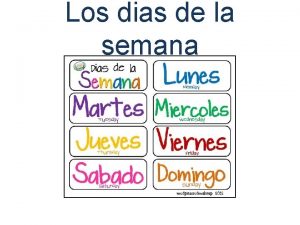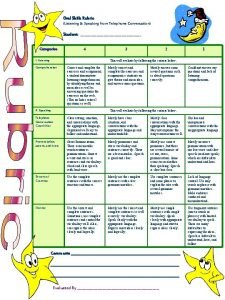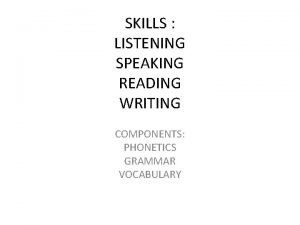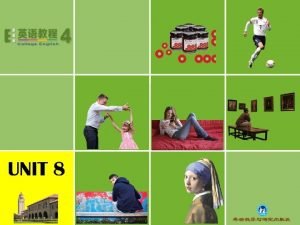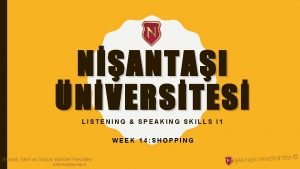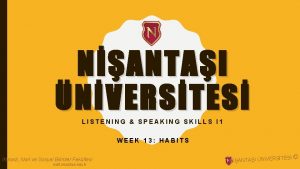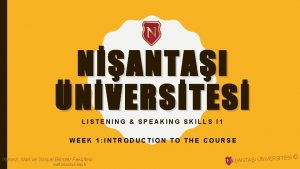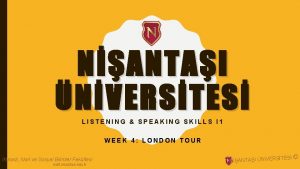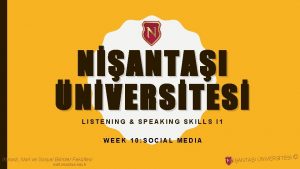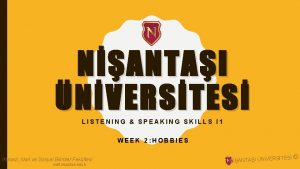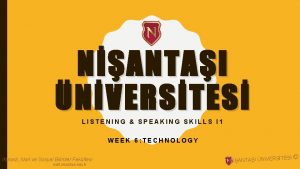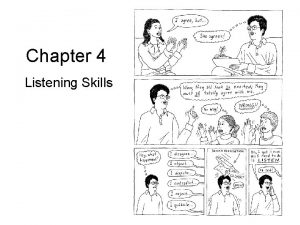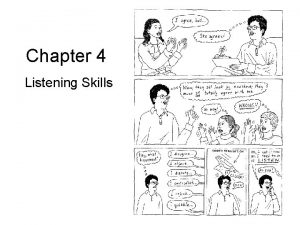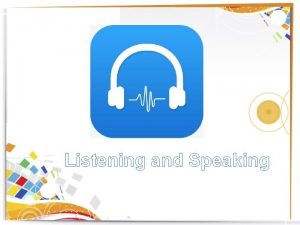NANTAI NVERSTES LISTENING SPEAKING SKILLS I 1 WEEK












- Slides: 12

NİŞANTAŞI ÜNİVERSİTESİ LISTENING & SPEAKING SKILLS I 1 WEEK 7: BRAIN TRAINING & BILINGUALISM İktisadi, İdari ve Sosyal Bilimler Fakültesi iisbf. nisantasi. edu. tr NİŞANTAŞI ÜNİVERS İTESİ ©

PRE-LISTENING ACTIVITIES A. Try to say the colour not the word! B. This brain training activity helps to improve concentration. Discuss in pairs: • Make a list of activities and ways to train your brain. NİŞANTAŞI ÜNİVERSİTESİ ©

C. YOU ARE GOING TO LISTEN TO A TEXT ABOUT TECHNOLOGY. YOU NEED THE FOLLOWING WORDS TO UNDERSTAND IT. MATCH THE WORDS ON THE LEFT WITH THEIR DEFINITIONS ON THE RIGHT. 1. Boost (V) a. having the usual qualities of a particular type of person or thing. 2. Challenge (N) b. have or include something or someone as a necessary part or result of something. 3. Typical (A) c. keep (something) from happening or stop (someone) from doing something 4. Damage (N) d. (of a person) using the right hand more naturally than the left or (of a tool or item of equipment) made to be used with the right hand. 5. Involve (V) e. a call to someone to participate in a competitive situation or fight to decide who is superior in terms of ability or strength 6. Prevent (V) f. possession of the means or skill to do something or talent, skill, or proficiency in a particular area 7. Right handed (A) g. physical harm that impairs the value, usefulness, or normal function of something. 8. Ability –ies (N) h. help or encourage something or someone to increase or improve, amplify, push from below NİŞANTAŞI ÜNİVERSİTESİ ©

D. FILL THE GAPS WITH THE CORRECT WORDS FROM THE BOX ABOVE. CHANGE THE WORD FORMS WHEN NECESSARY. SOME WORDS ARE USED MORE THAN ONCE. 1. The teachers encourage their students to develop as many ______as possible during the semester. To do so, the students are required to _________ themselves in active participation during class and dynamic study techniques. 2. To ________ bad surprises at the end of the semester with attendance records, students need to be present to all classes. 3. Firdevs can use both hands because she is __________ to write with a pen and she is ___________ to eat. 4. The ____________to the buildings and cars caused by yesterday’s storm is shocking! 5. A white dress is a _____ wedding attire and it’s rare to see a bride in a pants suit. 6. Facing Bayern Munich in the UEFA Champions League is a big _______ for all teams. 7. The fund raising campaign was a success: it _________ the interest of most social media users. NİŞANTAŞI ÜNİVERSİTESİ ©

WHILE- LIS TENING FIL L T HE GA PS WITH THE RIGHT WORD S F ROM THE AUD IO. brain training fit and healthy prevent damage right handed protective executive functions bilingualism stroke enhance neurons stimulate • Sophie Hello and welcome to 6 Minute English. I'm Sophie… • Neil Watashi-wa Ni-ru. • Sophie What did you say? • Neil Watashi-wa Ni-ru. 'I'm Neil. ' It's Japanese Sophie. • Sophie Very good, Neil! So your Japanese language lessons are going well, then? • Neil They are indeed. And did you know, Sophie, that scientists believe learning a second language can boost brainpower? 1 _______ – or speaking two languages equally well – is a form of brain training. • Sophie 2 _________ is where you're learning ways to increase your memory or intelligence That's great Neil, but you're not exactly bilingual are you? • Neil Not yet. No. • Sophie Well, brain training is the subject of today's show. And ways to train your brain might be doing a crossword puzzle, playing chess, or studying a new language! Now I have a question for you, Neil. • Neil I hope my brain is up to the challenge. • Sophie I'm sure it is. Can you tell me: How many 3 ________ – or nerve cells – are there in the typical human brain? • Is it …a) 8. 6 billion b) 86 billion Or c) 860 billion • Neil • Sophie Well, we'll find out later on in the show whether you got the answer right or not. But now let's listen to neuropsychologist Dr Catherine Loveday talking about why being bilingual may protect your brain from 4 _________ if you have a stroke. • What is your answer? • Dr Catherine Loveday, neuropsychologist • I think theory behind why bilingualism might be a 5 ______ factor is that [it] involves a lot of switchings – a lot of attentional changes – lots of switching. And that seems to exercise the sort of executive parts of our brain. Those parts of the brain are kind of stronger and fitter when it comes to resisting some kind of damage from the stroke. • Neil A 6 _________ is a serious illness that occurs when blood flow to an area of the brain is cut off. And 7 ___________ are the mental skills involved in doing things like problem solving and planning. Hmm. I'm going to say a) 8. 6 billion. NİŞANTAŞI ÜNİVERSİTESİ ©

WHILE- LISTENING FILL THE GAPS WITH THE RIGHT WORDS FROM THE AUDIO. brain training fit and healthy prevent damage right handed protective executive functions bilingualism stroke enhance neurons stimulate • Sophie So when a bilingual speaker switches – or changes – from one language to another – this exercises the executive parts of their brain, making it stronger and fitter. And because the brain is stronger, it's able to resist – or 8 _________ – damage caused by a stroke. • Neil But many of us aren't bilingual are we? So our brains aren't going to be protected against strokes. • Sophie Don't worry, Neil. There are other things you can do to exercise your brain. If you're 9 ______________, doing tasks like brushing your teeth with your left hand will 10 ________ your brain – or getting dressed in the dark with your eyes shut. Or simply memorizing a list of words, for example your shopping list. • Neil Doing things with the wrong hand sounds hard. But the shopping list thing sounds easier… OK. Let's see… pizza, doughnuts, crisps, bottle of coke, chocolate cake… • Sophie That's not a very healthy list, Neil! A good diet is also important in keeping your brain 11 ________ and healthy. • Neil Maybe I should cut down on the chocolate cake then? • Sophie Actually, that's one thing you could leave on the list. According to research chocolate may 12 ________ – or improve – cognitive performance, and that is your ability to acquire and utilize knowledge. Now NİŞANTAŞI ÜNİVERSİTESİ © let's listen to Dr Loveday talking about building up our cognitive reserve – this is the idea of building up extra abilities to help protect the brain against declining memory or thinking.

WHILE- LISTENING FILL THE GAPS WITH THE RIGHT WORDS FROM THE AUDIO. Take up languages Memorize Put someone’s mind at rest Calculate Brain cells Cognitive reserve • Dr Catherine Loveday, neuropsychologist Continually just stimulating the brain – things like learning a language, learning music just educating yourself, seems to continue to build up that 1 ____________. So even if people 2 ____________ or take up other things later in life it will give them a degree of protection. • Neil Sophie? • Sophie • Neil • Sophie And if you 3 ____________ you stop them worrying. Well, don't get too relaxed Neil – your brain needs constant stimulation, remember? • Neil Hmm. I think I might just lie down after the show with a box of chocolates and today's crossword… or maybe I'll 4 _________ another shopping list… this time in Japanese. • Sophie Stimulate means to make something become more active. Hmm. Not sure I'm continually stimulating my brain. What do you think, With all our stimulating discussions, Neil, I'm sure we're both building up our cognitive reserve. And there are your Japanese lessons too. Well, so I am doing well as far as my cognitive reserve goes. Sophie you've put my mind at rest. OK. I think it's time to hear the answer to today's quiz question. I asked: How many neurons are there in the typical human brain? • Is it … a) 8. 6 billion b) 86 billion or c) 860 billion? • Neil • Sophie I thought you were feeling clever today, Neil. I'm afraid that's wrong answer. It's b) 86 billion. But do you know how scientists 5 _________ that number? • Neil • Sophie No, not exactly. Apparently, the easiest way is to count how many neurons there are in one part of the brain and then multiply that for the rest of the brain's volume. • Neil • Sophie And I said a) 8. 6 billion. Did they have a guess, Sophie? Well, that's a lot of 6 ___________. OK, can we hear the words we learned today? They are: bilingualism functions resist someone's mind at rest brain training stimulate neurons switches • Neil Well, that's the end of today's 6 Minute English. Don't forget to join us again soon! NİŞANTAŞI ÜNİVERSİTESİ © • Both Bye. stroke cognitive enhance reserve executive put

B. ANSWER THE QUESTIONS BELOW ACCORDING TO THE AUDIO. 1. Who is Catherine Loveday? 2. What are the activities that protect the brain against mental illnesses? 3. Which part of the brain needs exercise to prevent strokes? 4. Why might bilingualism be a protective factor against strokes? 5. Which food can improve cognitive performance? Is it a) chocolate b) Celery c) Lettuce c) Pizza 6. What can you do to exercise your brain if you are not bilingual yet? 7. How many neurons – or nerve cells – are there in the typical human brain? Is it … a) 8. 6 billion b) 86 billion c) 860 billion 8. Being bilingual means to speak English and Japanese very well. T or F NİŞANTAŞI ÜNİVERSİTESİ ©

ANSWER THE QUESTIONS BELOW ACCORDING TO THE AUDIO. 9. Underline the unhealthy food in this list: • Apple Humus Soda Cake Celery Gum • Coffee Milk Sweets Kunefe Pizza Kebab • Lahmacun Soup Lettuce Burger Doughnut Chips • Simit Fries Nuts Turkısh Delight Pretzels Beans NİŞANTAŞI ÜNİVERSİTESİ ©

ANSWER THE QUESTIONS BELOW ACCORDING TO THE AUDIO. C. Let’s test your brain power…. DON’T LOOK BACK!!!!! How many food items from question No 9 can you remember without looking? Unhealthy food Turkish food Other food items NİŞANTAŞI ÜNİVERSİTESİ ©

POST-LISTENING ACTIVITIES • Work in pairs. Your friend will make three sentences using three new words from the audio. Listen to your friend and try to write the sentences using your non-dominant hand. • What do you do to exercise your brain. Tell your partner. NİŞANTAŞI ÜNİVERSİTESİ ©

REFERENCES • http: //www. bbc. co. uk/learningenglish/features/6 -minute-english NİŞANTAŞI ÜNİVERSİTESİ ©
 Nantai cash
Nantai cash Nantai 37
Nantai 37 Stages of listening lesson
Stages of listening lesson Listening pattern
Listening pattern Slidetodoc
Slidetodoc Conclusion of communication
Conclusion of communication Week by week plans for documenting children's development
Week by week plans for documenting children's development Días de la semana
Días de la semana Success criteria for listening skills
Success criteria for listening skills Action plan to improve english speaking skills
Action plan to improve english speaking skills Listening and speaking rubric
Listening and speaking rubric Grammar listening speaking reading writing
Grammar listening speaking reading writing Grammar listening speaking reading writing
Grammar listening speaking reading writing


